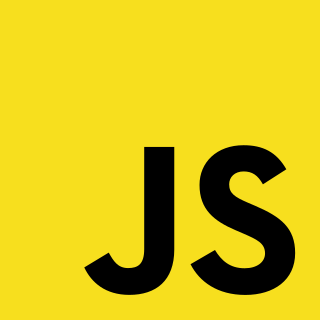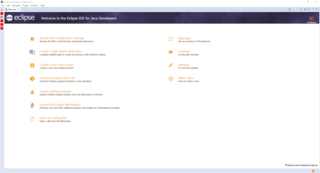
JavaScript, often abbreviated as JS, is a high-level, interpreted programming language that conforms to the ECMAScript specification. JavaScript has curly-bracket syntax, dynamic typing, prototype-based object-orientation, and first-class functions.

KDevelop is a free and open-source integrated development environment (IDE) for Unix-like computer operating systems and Microsoft Windows. It provides editing, navigation and debugging features for several programming languages, and integration with build automation and version-control systems, using a plugin-based architecture.

Eclipse is an integrated development environment (IDE) used in computer programming, and is the most widely used Java IDE. It contains a base workspace and an extensible plug-in system for customizing the environment. Eclipse is written mostly in Java and its primary use is for developing Java applications, but it may also be used to develop applications in other programming languages via plug-ins, including Ada, ABAP, C, C++, C#, Clojure, COBOL, D, Erlang, Fortran, Groovy, Haskell, JavaScript, Julia, Lasso, Lua, NATURAL, Perl, PHP, Prolog, Python, R, Ruby, Rust, Scala, and Scheme. It can also be used to develop documents with LaTeX and packages for the software Mathematica. Development environments include the Eclipse Java development tools (JDT) for Java and Scala, Eclipse CDT for C/C++, and Eclipse PDT for PHP, among others.

GPE is a graphical user interface environment for handheld computers, such as palmtops and personal digital assistants (PDAs), running some Linux kernel-based operating system. GPE is a complete environment of software components and applications which makes it possible to use a Linux handheld for tasks such as personal information management (PIM), audio playback, email, and web browsing.

WebKit is a browser engine used in Apple's Safari browser and other products.

Code::Blocks is a free, open-source cross-platform IDE that supports multiple compilers including GCC, Clang and Visual C++. It is developed in C++ using wxWidgets as the GUI toolkit. Using a plugin architecture, its capabilities and features are defined by the provided plugins. Currently, Code::Blocks is oriented towards C, C++, and Fortran. It has a custom build system and optional Make support.

Dojo Toolkit is an open-source modular JavaScript library designed to ease the rapid development of cross-platform, JavaScript/Ajax-based applications and web sites. It was started by Alex Russell, Dylan Schiemann, David Schontzler, and others in 2004 and is dual-licensed under the modified BSD license or the Academic Free License.

Google Web Toolkit, or GWT Web Toolkit, is an open-source set of tools that allows web developers to create and maintain complex JavaScript front-end applications in Java. Other than a few native libraries, everything is Java source that can be built on any supported platform with the included GWT Ant build files. It is licensed under the Apache License version 2.0.
The following tables list notable software packages that are nominal IDEs; standalone tools such as source code editors and GUI builders are not included. These IDEs are listed in alphabetical order of the supported language.

SilverStripe is a free and open source Content Management System (CMS) and Framework for creating and maintaining websites and web applications. It provides an out of the box web-based administration panel that enables users to make modifications to parts of the website, which includes a WYSIWYG website editor. The core of the software is SilverStripe Framework, a PHP Web application framework.
Morfik Technology Pty Ltd. is an Australian software company that was acquired by Altium in 2010.
SproutCore is an open-source JavaScript web framework. Its goal is to allow developers to create web applications with advanced capabilities and a user experience comparable to that of desktop applications. When developing a SproutCore application, all code is written in JavaScript. A notable fork of SproutCore is Ember.js. Both projects are maintained separately and have taken different directions.

Pyjs, is a rich Internet application framework for developing client-side web and desktop applications in Python. The resulting applications can be run in a web browser or as standalone desktop applications.

Qt Creator is a cross-platform C++, JavaScript and QML integrated development environment which is part of the SDK for the Qt GUI application development framework. It includes a visual debugger and an integrated GUI layout and forms designer. The editor's features include syntax highlighting and autocompletion. Qt Creator uses the C++ compiler from the GNU Compiler Collection on Linux and FreeBSD. On Windows it can use MinGW or MSVC with the default install and can also use Microsoft Console Debugger when compiled from source code. Clang is also supported.
Dart is a general-purpose programming language originally developed by Google and later approved as a standard by Ecma (ECMA-408). It is used to build web, server, desktop, and mobile applications.

Mono is a free and open-source project to create an Ecma standard-compliant .NET Framework-compatible software framework, including a C# compiler and a Common Language Runtime. Originally by Ximian, it was later acquired by Novell, and is now being led by Xamarin, a subsidiary of Microsoft and the .NET Foundation. The stated purpose of Mono is not only to be able to run Microsoft .NET applications cross-platform, but also to bring better development tools to Linux developers. Mono can be run on many software systems including Android, most Linux distributions, BSD, macOS, Windows, Solaris, and even some game consoles such as PlayStation 3, Wii, and Xbox 360.
Wakanda is a JavaScript platform to develop and run web or mobile apps.
Blink is a browser engine used in the Google Chrome browser and many other projects. It is developed as part of the Chromium project with contributions from Google, Opera Software ASA, Adobe Systems, Intel, Samsung and others. It was first announced in April 2013.

Eclipse Che is an open-source Java based developer workspace server and cloud integrated development environment (IDE). It includes a multi-user remote development platform. The workspace server comes with a flexible RESTful webservice. It also contains a SDK for creating plug-ins for languages, frameworks or tools. The main difference between Eclipse Che and the standard Eclipse IDE is its ability to create Docker containers to execute applications. Eclipse Che is an Eclipse Cloud Development (ECD) top-level project, allowing contributions from the user community.












